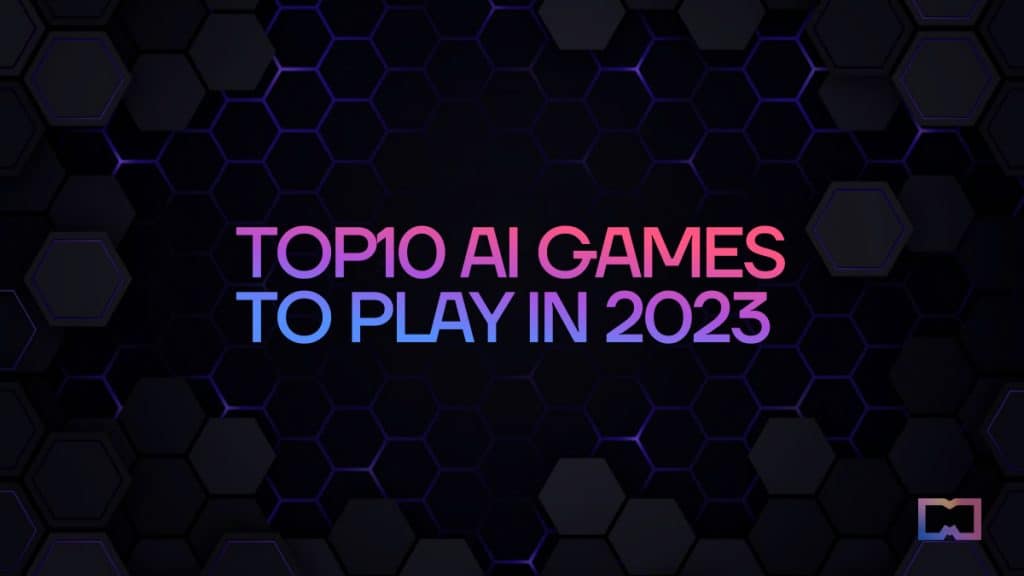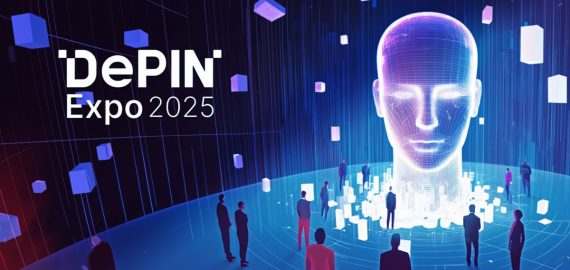Top 10 AI Games to Play in 2023



Artificial intelligence may have become an explosive topic lately, but AI games have been around for several years, long before the generative AI boom. These games harness the power of artificial intelligence that adapt, challenge, and learn from players.
AI games come in various forms, catering to different preferences and interests. From strategic warfare simulations and realistic sports simulations to narrative-driven adventures and puzzle-solving challenges, there is an AI game for every kind of player. Some AI games offer cooperative or competitive multiplayer experiences, allowing players to team up or face off against AI-controlled opponents. The versatility of AI technology enables game developers to continuously innovate, creating new and exciting experiences that push the boundaries of what is possible in gaming.
The Inner Workings of AI Technology in Games
At the heart of AI games lies a complex network of algorithms and machine learning techniques. Through extensive training on vast datasets, AI models gain the ability to perceive, reason, and react within the game environment. This allows them to generate realistic behaviors, adapt to player actions, and provide engaging gameplay experiences. Reinforcement learning algorithms enable AI agents to improve their strategies over time by learning from trial and error, ensuring that players face increasingly challenging opponents and dynamic gameplay scenarios.
Many games, however, do not leverage AI in the traditional sense. Instead, they use procedural generation – a method of creating content in a game using algorithms – to create dynamic game environments and characters without the need for a human or manual designer.
Procedural generation and AI are two different techniques, but they can be used together to create more complex and engaging games. For example, procedural generation can be used to create a vast and varied world, while AI can be used to populate that world with intelligent enemies and NPCs.
The Appeal of AI Games
AI games offer a unique appeal that sets them apart from traditional games. One of the main draws is the thrill of competing against intelligent adversaries that can learn, adapt, and outsmart players—it’s often impossible to win against AI in a game. The unpredictability of AI opponents adds an exhilarating element to the gameplay, pushing players to strategize, react quickly, and constantly improve their skills. Furthermore, AI games often provide vast and immersive virtual worlds, complete with captivating narratives and lifelike characters. In this listicle, we explore 10 of the most popular AI games that have captivated players worldwide in recent years.
Top 10 AI Games to Play
AI Dungeon
Created in 2019 by Nick Walton of Brigham Young University’s “Perception, Control, and Cognition” deep learning laboratory and inspired by the tabletop game Dungeons & Dragons (D&D), AI Dungeon is a text-based interactive fiction adventure game that uses GPT-3 to generate a story based on the player’s input. Players can choose from a variety of settings and genres (e.g., fantasy, mystery, apocalyptic, cyberpunk, zombies), and the AI will create a unique story for them.
The game adapts and responds to most of the actions entered by the player. Leaving the input blank can be used as a way to prompt the AI to generate further content. The game allows players to undo, redo, or modify recent events in order to enhance the narrative of the game. Players also have the ability to explicitly instruct the AI to “remember” certain elements for future parts of their play-through, allowing for continuity and reference in subsequent gameplay experiences.
By June 2020, AI Dungeon had reached 1.5 million active users. In July 2020, AI Dungeon’s developers, Latitude, released the premium-exclusive Dragon large language model (LLM) based on the GPT-3 DaVinci that can be incorporated into the game. The Dragon model has a massive vocabulary of over 175 billion words, and it can generate text, translate languages, write different kinds of creative content, and answer questions in an informative way. The free model was also upgraded to a less advanced version of GPT-3 and was named Griffin.
Pros:
- Allows players to generate their own stories and adventures.
- Free to play, which makes it accessible to a wider audience.
- Easy to use and can be played on Windows, Mac, Android and iOS.
Cons:
- The Dragon model can be expensive to use.
- The game may occasionally produce inconsistent or unexpected responses due to the inherent challenges of training AI models to understand and generate coherent narratives.
- The open-ended gameplay mechanics and progression systems may feel unstructured to those who prefer more structured gameplay experiences.
Deep Rock Galactic
Released in 2020, Deep Rock Galactic is a cooperative first-person shooter video game developed by Ghost Ship Games. In Deep Rock Galactic, players take on the roles of space-faring dwarves working for the mining corporation known as Deep Rock Galactic. Their mission is to explore procedurally generated caves, gather valuable resources, and fight off hostile creatures that inhabit the planet’s depths.
The game includes AI-controlled dwarves called Bosco that can fill in as teammates to provide support and backup during missions. It also features enemy AI creatures that utilize AI algorithms to react to player movements and actions. The enemy AI adds depth and unpredictability to the gameplay, keeping players on their toes.
Deep Rock Galactic utilizes AI algorithms for procedural generation to create the layout of the caves, the placement of resources, environmental hazards, and enemy spawns. AI is also integrated into the game through Mission Control, a central AI character that provides objectives, guidance, and mission briefings through voice lines and text-based communication. This AI character adds context and narrative to the game, giving players a sense of purpose and direction.
Pros:
- Cooperative gameplay that fosters communication and camaraderie among players.
- Procedurally generated environments that enhance replayability and provide a sense of discovery and unpredictability.
Cons:
- The game primarily revolves around completing missions in procedurally generated caves, which can lead to a repetitive experience over time.
- The game has a steep learning curve that may pose a challenge, especially for new players. Mastering the different dwarf classes, understanding mission objectives, and effectively managing resources and enemy encounters can take time and practice.
- While AI-controlled teammates are available for those playing alone, players seeking a strong single-player experience may find the cooperative nature of Deep Rock Galactic less engaging.
Humankind
Humankind is a turn-based strategy game developed by Amplitude Studios. Released for Microsoft Windows and macOS in 2021, it offers players the opportunity to guide their civilization from the Neolithic era to the modern age, shaping its culture, technology, and historical legacy.
The game features AI-controlled opponents that provide challenging competition by employing advanced algorithms to make strategic decisions, manage their cities, and conduct diplomacy. In Humankind, players can choose different cultures offering unique gameplay traits, bonuses, and special abilities to shape their civilization’s identity. The AI considers the strengths and weaknesses of different cultures, adapting its strategies to leverage their respective advantages.
Humankind also features an AI-driven dynamic world that generates and manages randomized terrain, resources, and events to create a diverse and evolving game environment. Lastly, the game incorporates an AI-driven advisor system that analyzes the current game state to offer recommendations on various aspects of gameplay, such as city development, technological research, military strategies, and diplomatic decisions.
Pros:
- High level of flexibility in gameplay, allowing players to customize their civilization’s development path, cultural influences, and societal choices.
- Its cultural evolution system allows for diverse playstyles and strategic approaches.
- Provides options for both cooperative and competitive gameplay, fostering social interactions and strategic challenges among friends or other players online.
Cons:
- The abundance of choices and intricacies of gameplay may require a significant investment of time and effort to fully grasp.
- Some players have found AI to be lacking in strategic depth and consistency.
- Some players have encountered crashes, performance problems, or gameplay imbalances.
No Man’s Sky
No Man’s Sky is a procedurally generated space exploration game, meaning the game world is constantly changing, and no two planets are exactly alike. It features a procedurally generated universe with billions of unique planets, each with its own flora, fauna, and ecosystems.
Using complex mathematical models to create a vast and diverse universe, AI generates the planetary terrain, weather patterns, wildlife behaviors, and other environmental elements. This AI-driven procedural generation ensures that each planet and its inhabitants feel distinct, offering players a virtually infinite number of unique worlds to explore. The game’s procedurally generated creatures that inhabit the different planets have their own AI-driven behaviors, such as feeding, mating, and interacting with their surroundings.
No Man’s Sky incorporates AI-driven non-player characters (NPCs) that players can interact with, including alien species and space traders. These NPCs have their own unique personalities, languages, and behaviors. The AI algorithms enable these characters to respond to player actions and engage in conversations, offering quests, trading resources, or providing useful information. AI algorithms are also employed to generate quests and missions within the game.
Pros:
- Offers a virtually infinite universe with countless planets to explore.
- Allows players to follow their own path, catering to a wide range of playstyles and preferences.
- Continuous development and updates to the game address previous concerns and add new layers of depth and gameplay possibilities.
Cons:
- The core activities of resource gathering, inventory management, and completing similar tasks can become repetitive over time.
- Some players experienced crashes, bugs, and performance issues that affected their overall experience.
StarCraft II
Developed by Blizzard Entertainment, StarCraft II is a real-time strategy game that takes place in a science fiction universe and revolves around three unique factions, each with their own strengths, weaknesses, and strategies. The AI-controlled factions are designed to simulate intelligent decision-making and strategic gameplay. AI opponents adapt to player tactics, adjust their strategies, and provide a dynamic and engaging gameplay experience. Their difficulty levels can be adjusted, allowing players to find the right balance of challenge and enjoyment.
In the campaign mode, players encounter AI-controlled characters and factions that engage in conversations, provide quests, and participate in missions, adding depth and context to the game’s storyline. Additionally, the game leverages AI algorithms to generate randomized skirmish maps to provide a high level of replayability.
StarCraft II’s multiplayer mode features AI-controlled opponents for players who prefer to practice or play offline. The AI opponents in multiplayer matches mimic human-like behavior and provide a challenging experience for players of varying skill levels.
Pros:
- Offers a high level of strategic depth, requiring players to make critical decisions on resource management, unit composition, and tactical positioning.
- Varied faction gameplay adds depth and replayability to the game.
Cons:
- The game’s complexity, fast-paced gameplay, and deep mechanics can be overwhelming for beginners.
- Demands a significant time commitment to improve and stay competitive.
- Players seeking a primarily single-player experience may feel that the game’s emphasis on multiplayer limits their options for ongoing solo content.
Dreamscaper
Released in 2020, Dreamscaper is a dungeon crawler RPG that uses AI to generate its levels and enemies. The game is set in the subconscious mind of its protagonist, and players must explore their dreams to find the source of their nightmares. The levels are constantly changing, and the enemies are always adapting to the player’s playstyle. This creates a sense of urgency and excitement that keeps players engaged.
Dreamscaper utilizes AI-driven procedural generation to create unique dream worlds for players to explore. It also uses AI to generate its enemies, which are all unique and challenging, and defeating them requires strategic thinking from the player. The game also incorporates an adaptive difficulty system that adjusts the challenge level based on player performance.
Pros:
- Fast-paced, action-packed gameplay with a combination of hack-and-slash combat and strategic decision-making.
- Emotional storytelling and character development.
- Visually stunning dreamscapes with vibrant and surreal environments.
Cons:
- The core loop of entering dreamscapes, battling enemies, and collecting resources can become familiar after multiple playthroughs.
- Some players may find the initial difficulty level or the need for trial-and-error frustrating before becoming more proficient.
- The limited progression options could leave players feeling unsatisfied.
Inscryption
Developed by Daniel Mullins Games, Inscryption is an indie game that blends elements of card-based deck-building, puzzle-solving, and psychological horror. It was released for Microsoft Windows and macOS in October 2021. The game is set in a cabin in the woods, where the player is trapped by a mysterious man named Leshy. The player must play a card game against Leshy to escape. The game’s cards are made up of animals, plants, and objects that can be sacrificed to create stronger cards.
It is primarily a single-player game that focuses on the player’s interactions with the game’s mechanics, puzzles, and narrative elements. The game’s AI opponent, Leshy, is able to adapt to the player’s playstyle, meaning that the game will become more difficult as the player progresses.
Pros:
- Innovative and challenging gameplay requiring strategic thinking and problem-solving skills.
- Features a compelling and mysterious storyline that unfolds as players progress through the game.
Cons:
- May require careful exploration and experimentation to progress, which will not be suitable for those who prefer more explicit guidance or clearer instructions.
- The game’s niche design and unconventional mechanics may limit its accessibility to a specific audience.
Loop Hero
Loop Hero, developed by Four Quarters, is an indie roguelike game that combines elements of strategy, RPG, and deck-building. In Loop Hero, the player controls a hero who is trapped in a time loop. The player must build a loop by placing various terrain tiles, such as forests, mountains, and roads, to create a unique loop around the hero to defeat enemies and progress through the game.
Controlled by AI, the game’s enemies will move and attack the hero on their own. In the AI-generated game environment, the player will never encounter the same loop twice. The game’s loot system is also powered by AI, meaning the player will find different loot each time they complete a loop.
Pros:
- The combination of strategic decision-making, resource management, and character progression keeps players engaged and invested in each run.
- The procedural generation in Loop Hero ensures that each run is unique, with different layouts, enemy encounters, and resources.
Cons:
- Its core gameplay loop can become repetitive over time.
- Some may find the passive nature of Loop Hero’s gameplay less engaging.
Manifold Garden
Manifold Garden is a first-person puzzle game developed by William Chyr Studio and published by Devolver Digital. It was released for Microsoft Windows, macOS, Linux, Nintendo Switch, PlayStation 4, and Xbox One in August 2019.
In the game, players navigate a surreal and gravity-defying world where the laws of physics and geometry constantly shift. The game’s world is procedurally generated, meaning each playthrough offers a different arrangement of structures, puzzles, and environments. While Manifold Garden does not have AI-controlled opponents or characters, it utilizes advanced physics simulations to create a dynamic and interactive environment.
Pros:
- The game’s gravity-defying puzzles and non-Euclidean geometry challenge players to think outside the box.
- Visually captivating design with intricate architectural structures.
- Offers thought-provoking philosophical concepts such as perception, infinity, and interconnectedness
Cons:
- Requires patience, persistence, and adaptability to fully understand and progress in the game.
- There may be less incentive to replay it once players have completed the game.
- The absence of clear direction may be frustrating for some players.
The Turing Test
The Turing Test is a first-person puzzle game developed by Bulkhead Interactive and published by Square Enix. The game is set in a future where artificial intelligence has become so advanced that it is indistinguishable from human intelligence. The player takes on the role of Ava, an AI created by a company called Turing Test. Ava is being tested to see if she can pass the Turing Test, a test of a machine’s ability to exhibit intelligent behavior equivalent to, or indistinguishable from, that of a human.
In terms of AI incorporation, The Turing Test explores the philosophical aspects of AI and poses questions about the nature of consciousness. The game’s narrative delves into the ethical implications of creating intelligent machines and explores the concept of artificial intelligence gaining human-like qualities. Through the game’s storyline and interactions with other characters, players are prompted to contemplate the moral and ethical dilemmas surrounding AI.
While The Turing Test doesn’t incorporate advanced AI mechanics in its gameplay, it utilizes AI as a thematic element to drive the story and engage players in thought-provoking discussions about the nature of intelligence and consciousness.
Pros:
- Offers a variety of challenging and thought-provoking puzzles that require players to use logic, observation, and problem-solving skills to progress through the game.
- The game’s narrative raises philosophical questions about the nature of consciousness and the ethics of artificial intelligence.
- Features a visually impressive environment, set within a research facility on Jupiter’s moon.
Cons:
- The core gameplay loop of manipulating energy spheres and activating switches can feel monotonous.
- The lack of alternative paths or significant branching narratives can diminish the desire to replay the game.
- Relies heavily on established puzzle-solving mechanics without pushing the boundaries of the genre.
AI Game Comparison Cheatsheet
| Game | AI Features | Devices | Pros | Cons |
| AI Dungeon | AI-generated storytelling, adaptive responses | PC, web browser, mobile devices | 1. Infinite storytelling possibilities 2. Flexibility in player input 3. Constant updates and improvements | 1. AI-generated content may lack coherence 2. Limited graphics and visual immersion 3. Potential for repetitive gameplay |
| Deep Rock Galactic | AI-controlled enemies, dynamic enemy behavior, cooperative AI | PC, Xbox, PlayStation | 1. Challenging cooperative gameplay 2. Dynamic enemy behavior and AI 3. Deep customization and progression | 1. Steep learning curve for beginners 2. Limited single-player experience 3. Some technical issues and bugs |
| Humankind | AI-controlled civilizations, dynamic AI diplomacy, adaptive AI | PC, Mac | 1. Strategic depth and complex AI 2. Dynamic AI diplomacy and interactions 3. Multiple paths to victory | 1. Steep learning curve for newcomers 2. Some AI behavior can be predictable 3. Late game pacing can be slow |
| No Man’s Sky | AI-generated planets, creatures, and ecosystems | PC, PlayStation, Xbox | 1. Vast procedurally generated universe 2. Freedom for exploration and discovery 3. Regular updates and content additions | 1. Some find gameplay repetitive or grindy 2. Multiplayer experience can be lacking |
| StarCraft II | AI-controlled opponents, advanced AI strategies | PC, Mac | 1. Competitive and strategic gameplay 2. Robust AI opponent with different levels | 1. High barrier to entry for new players 2. Demands a significant time commitment to improve and stay competitive 3. Single-player campaign can feel lacking |
| Dreamscaper | AI-driven character relationships, adaptive gameplay mechanics | PC, Xbox, Nintendo Switch | 1. Unique blend of action and RPG 2. Dynamic character relationships 3. Visually stunning dreamscapes | 1. Limited replayability without major updates 2. Some may find combat mechanics repetitive 3. Limited progression options |
| Inscryption | AI-controlled opponents, AI-generated card mechanics | PC, Nintendo Switch, PS4&5, Xbox One | 1. Innovative and challenging gameplay 2. Mysterious and immersive narrative | 1. May feel overwhelming for casual players 2. Accessibility limited to a specific audience |
| Loop Hero | AI-driven procedural generation, adaptive enemy difficulty | PC, MacOS, Nintendo Switch, Xbox One | 1. Addictive and strategic gameplay 2. Procedurally generated | 1. Repetitive gameplay loop 2. Lack of direct player control |
| Manifold Garden | Procedurally generated game world | PC, PlayStation, Xbox | 1. Mind-bending gameplay 2. Stunning visual design 3. Philosophical and thought-provoking | 1. Requires patience, persistence, and adaptability 2. Limited replay value 3. Lack of clear direction and guidance |
| The Turing Test | The game’s narrative explores the philosophical aspects of AI | Nintendo Switch, PlayStation 4, Xbox One, Microsoft Windows | 1. Engaging puzzle mechanics 2. Intriguing narrative 3. Atmospheric setting and visuals | 1. Repetitive gameplay elements 2. Limited replay value 3. Lack of gameplay innovation |
FAQ
Procedural generation and AI are distinct concepts, but they can be related in game development.
Procedural generation refers to the process of generating content like levels, landscapes, or items algorithmically rather than manually designing each element. It involves using mathematical algorithms and predefined rules to create content that appears random or varied.
AI, on the other hand, is used to create intelligent and autonomous entities within games, such as non-player characters (NPCs) or opponents, which can exhibit complex behaviors, adapt to player actions, and make decisions based on their environment and goals. While procedural generation and AI are separate concepts, they can be used together in game development. Procedural generation can create the content and environments that AI-controlled entities interact with
Yes. By leveraging player data and preferences, AI algorithms can tailor gameplay elements such as difficulty levels, challenges, and content to suit the player’s skill level and interests. This personalization enhances player engagement and provides a more tailored and immersive gaming experience. AI technology can also analyze player behavior in real time, adjusting the game environment and AI adversaries to match the player’s performance, ensuring a balanced and enjoyable experience.
Ethical considerations in AI games primarily revolve around the potential impact of AI technology on player experiences and societal implications. Fairness and transparency in AI algorithms are important to ensure that AI opponents are challenging but not unfairly biased. Additionally, the collection and use of player data must adhere to privacy and data protection regulations. AI game developers also need to consider the potential effects of immersive experiences on players’ well-being, ensuring that gaming experiences are enjoyable and inclusive and promote healthy habits. Responsible development and ethical considerations are vital to fostering a positive and sustainable future for AI games.
Yes. By incorporating AI technology, educational games can provide interactive and personalized learning experiences. AI algorithms can adapt the difficulty level and content to match the learner’s abilities, ensuring a tailored learning experience. It can also facilitate intelligent tutoring systems, providing feedback, guidance, and adaptive challenges based on the learner’s progress. Educational AI games can cover a wide range of subjects, from language learning and math to history and science, making learning more engaging and effective.
Developing robust and sophisticated AI algorithms can be time-consuming and resource-intensive. Balancing AI opponents’ difficulty levels to provide a challenging but fair gameplay experience can be a complex task. Additionally, ensuring the AI models generalize well across different player behaviors and preferences can be a challenge. Ethical considerations, such as addressing biases in AI algorithms and protecting player data, also need to be carefully managed. However, advancements in AI technology and ongoing research aim to overcome these challenges and unlock the full potential of AI games.
Conclusion
As AI technology continues to advance, developers are constantly exploring ways to integrate AI into game design, level generation, and procedural storytelling. AI-powered character companions and advanced virtual worlds that dynamically respond to player actions are becoming more prevalent. Additionally, AI technology can personalize gameplay experiences, tailoring challenges and content based on individual preferences. With ongoing advancements, AI games are poised to deliver even more immersive worlds, intelligent adversaries, and unforgettable adventures that will captivate players for years to come.
Read more:
Disclaimer
In line with the Trust Project guidelines, please note that the information provided on this page is not intended to be and should not be interpreted as legal, tax, investment, financial, or any other form of advice. It is important to only invest what you can afford to lose and to seek independent financial advice if you have any doubts. For further information, we suggest referring to the terms and conditions as well as the help and support pages provided by the issuer or advertiser. MetaversePost is committed to accurate, unbiased reporting, but market conditions are subject to change without notice.
About The Author
Cindy is a journalist at Metaverse Post, covering topics related to web3, NFT, metaverse and AI, with a focus on interviews with Web3 industry players. She has spoken to over 30 C-level execs and counting, bringing their valuable insights to readers. Originally from Singapore, Cindy is now based in Tbilisi, Georgia. She holds a Bachelor's degree in Communications & Media Studies from the University of South Australia and has a decade of experience in journalism and writing. Get in touch with her via [email protected] with press pitches, announcements and interview opportunities.
More articles

Cindy is a journalist at Metaverse Post, covering topics related to web3, NFT, metaverse and AI, with a focus on interviews with Web3 industry players. She has spoken to over 30 C-level execs and counting, bringing their valuable insights to readers. Originally from Singapore, Cindy is now based in Tbilisi, Georgia. She holds a Bachelor's degree in Communications & Media Studies from the University of South Australia and has a decade of experience in journalism and writing. Get in touch with her via [email protected] with press pitches, announcements and interview opportunities.

















































